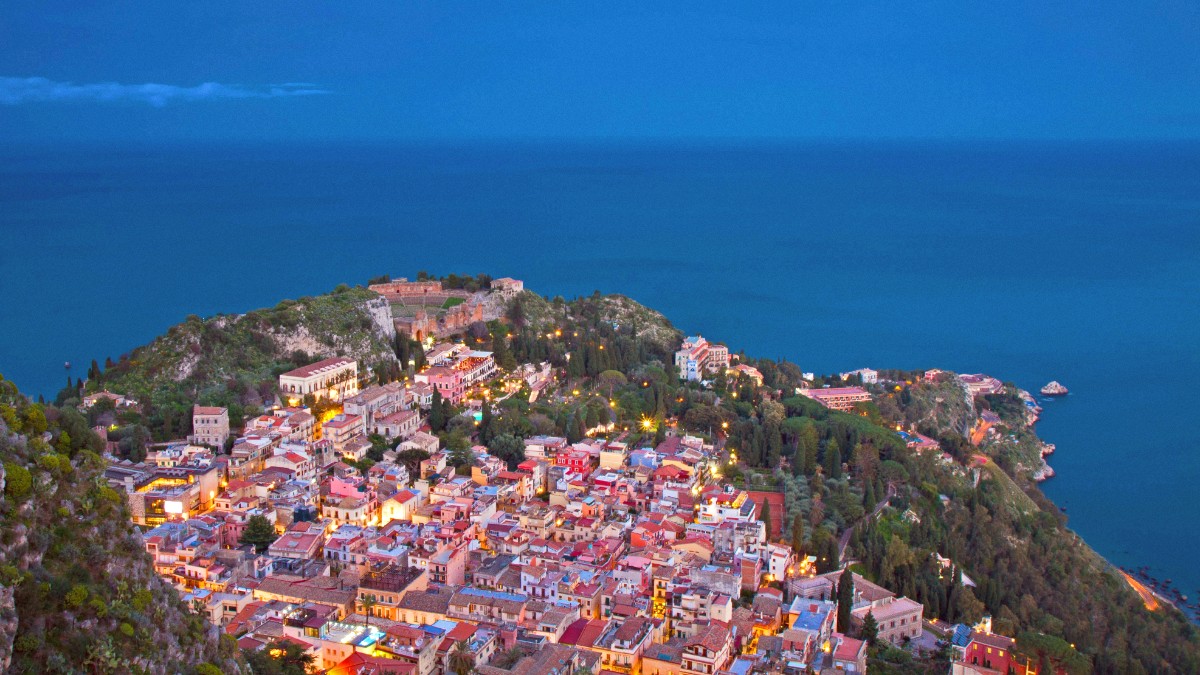
Sicily, Italy
Taormina is more than a destination; it is an experience, inviting travelers to slow down, savor the moment, and soak in centuries of layered history. From its dramatic clifftop position, Taormina commands attention, offering an unique perspective on Sicily's diverse appeal. Travelers find themselves quickly enchanted by its charm, its sun-drenched piazzas, and the timeless beauty that has attracted artists and writers for generations.
Taormina’s history stretches back millennia, a testament to its strategic position and natural beauty. Originally "Tauromenion," founded by ancient Greek colonists in the 4th century BCE.
The Greek legacy remains palpable today, most notably in the town's ancient Greek Theatre. Under Roman rule, from 212 BCE, Taormina flourished. Norman conquest in 1079 marked another significant chapter, blending architectural elements. In the 19th century, Taormina gained widespread fame as a prominent stop on the European Grand Tour, captivating figures like Goethe and Oscar Wilde.
Taormina has an approximate population of 11,000 residents (as of 2023), balancing a lived-in community with a bustling international resort. Its main industry is tourism, which drives the local economy and shapes the town's atmosphere.
The town presents an appealing atmosphere characterized by charming medieval streets that invite exploration on foot. Its piazzas serve as natural gathering spots, offering spectacular views. Taormina offers a distinctive blend of old-world charm and modern amenities. Its compact size means most attractions are within walking distance, though the hilly terrain provides a workout.
The town's most celebrated attraction, an architectural marvel with an unparalleled backdrop of Mount Etna and the sea.
A small, protected island directly below the town, a natural escape for swimmers and snorkelers.
A prominent piazza offering panoramic views and a stage for local life.
A fortress-like cathedral speaking to the town's medieval past.
Peaceful green spaces with additional scenic views.
Taormina's proximity to major cities offers convenience for travelers. Catania, home to Sicily's busiest airport, lies approximately 50 kilometers (31 miles) south. Messina, a major port city and gateway to mainland Italy, is about 50 kilometers (31 miles) north. Palermo, Sicily's capital, sits further west, around 200 kilometers (124 miles) away.
Taormina enjoys a temperate climate, favoring tourism for much of the year. It has hot, dry summers and mild, wet winters, contributing to its diverse natural backdrop.
The dramatic coastal landscape, with its cliffs, coves, and beaches, contrasts sharply with the rugged slopes of Etna, creating a diverse natural backdrop. This unique geographical setting is a main reason for Taormina's allure, offering both mountain and sea experiences within close reach.
The blend of historical richness, natural grandeur, and a welcoming atmosphere makes Taormina a truly special destination, attracting a discerning international clientele, a legacy that shapes its identity as a premier travel spot in Sicily.
Visitors are drawn by the unique combination of its historical sites, striking scenic beauty, and direct access to the coast.
The town thrives on its reputation for elegance and hospitality, making it a favored choice for travelers seeking a sophisticated yet authentic Sicilian experience.
Discover charming medieval streets and hidden spots on foot.
Experience performances with Mount Etna as a natural stage.
A precious gem offering swimming and nature experiences.
The town's strategic location also attracted Arab conquerors in the 9th century, who brought with them new agricultural techniques, architectural styles, and culinary traditions that remain woven into the fabric of Sicilian culture.
Drawn by ancient Greek and Roman ruins, especially the Greek Theatre, which provides a tangible link to millennia past.
Captivated by the panoramic views of Mount Etna, the Ionian Sea, and the unique landscape of Isola Bella.
Appreciate the blend of Sicilian, Greek, Roman, Arab, and Norman influences found in the town's architecture and cuisine.
Direct access to the Ionian Sea, with beaches like Mazzarò and the renowned Isola Bella for swimming and sunbathing.
Ancient sites, including the remarkably preserved Greek Theatre, Roman structures, and medieval architecture throughout the town.
Mount Etna excursions offer unique opportunities for hiking, skiing (in winter), and experiencing Europe's most active volcano.